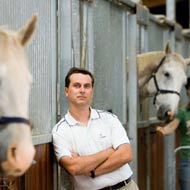
Health benefits of the bond need active input from owners
Speaking at the BVA Congress in London today, Professor Daniel Mills from the University of Liverpool said that dog ownership can be divided into either passive or active forms.
There is an implication that if you simply own a dog, a plethora of health benefits will ensue. But is this the reality? How much input is required from the owner to ensure that the benefits do actually occur?
He used the analogy of purchasing a piece of gym equipment. It will not keep you fit unless you use it!
There is evidence that having a dog in the household may well help children during life stage transitions and with their emotional and cognitive development. This may well include talking to the dog about their concerns too.
Successful pet ownership basically equates to the surrender of a degree of freedom in return for the benefits of the relationship with the pet. Dogs are seeking safety and security in return for their attachment and loyalty; whereas cats tend to provide for their own safety, although they will still form bonds with their owners.
It is important to distinguish between caring for a pet versus simply caring about it. Dogs need to be allowed to be dogs!
Peter Sandøe from the University of Copenhagen emphasised that despite the positive statistics about relationships between people and pets, there are many examples of companion animal owners who have difficult relationships with their pets.
The speaker focused on two examples – pet obesity and problems with brachycephalic breeds, both of which are a consequence of misguided emotional relationships between dogs and their owners. He suggested that there was a need for more dramatic and attention-grabbing methods of communicating the problems and their causes to owners – how a brachycephalic dog feels physically when it cannot breathe properly, for example.
Image courtesy of London Vet Show



 The Veterinary Medicines Directorate (VMD) is inviting applications from veterinary students to attend a one-week extramural studies (EMS) placement in July 2026.
The Veterinary Medicines Directorate (VMD) is inviting applications from veterinary students to attend a one-week extramural studies (EMS) placement in July 2026.